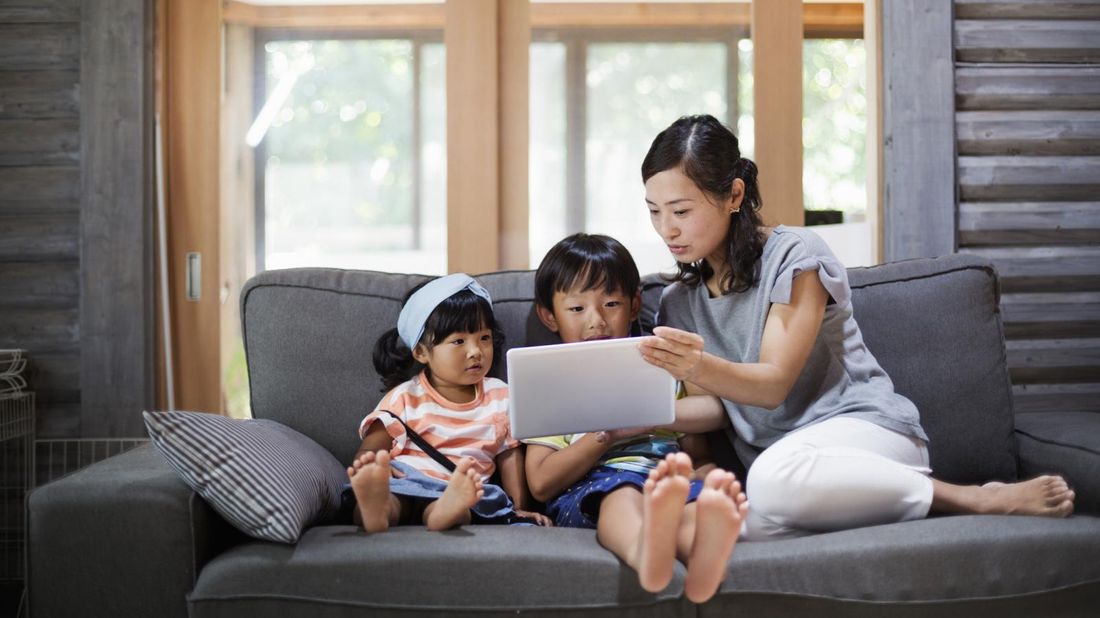How to Manage Your Kids’ Screen Time

With remote learning becoming the new normal and many parents relying on television, tablets and video games to keep their kids occupied, it’s easy to feel guilty over the amount of time your children are spending on a screen.
But there’s no need to beat yourself up over it. “For years, parents, educators and every grandparent have been saying that kids need to get outside more,” says University of Florida media professor Andrew Selepak. “But during a global pandemic, society now finds itself in a place where more screen time might be what keeps kids safe and parents sane during a lockdown."
So, cut yourselves some slack, and try some of these strategies for managing your kids’ screen time.
FACTOR IT INTO YOUR DAILY SCHEDULE
Screen time is a valuable tool for allowing parents to focus on work, complete chores or otherwise do whatever needs to get done that day. Instead of trying to grab minutes here and there to respond to an email or clean the kitchen, pencil in blocks of screen time.
“I've come to terms with my desire to utilize screen time by planning for it within our daily schedule,” says Rebecca Graham, a content manager for consumer review site Best Company. “Every morning after breakfast, schoolwork and an hour of playtime is our ‘show time.’ Since it’s part of the plan, I don't feel guilty about my kids watching PBS Kids or other pre-screened, age-appropriate shows. It's just a neutral part of our day that helps to keep me balanced in my dual roles as mother and work-from-home employee right now.”
MAKE IT AN EARNED PRIVILEGE
If you are concerned that too much screen time is making your kids unproductive, create a checklist that must be completed before they can use their devices, as personal finance and frugal living blogger Emily Bass did.
“Our list includes getting fully ready for the day, completing their at-home schoolwork, doing something creative, playing outside, doing chores and reading,” she says. “There is now more productivity in the house and far less whining about not getting screens.”
This also helps kids practice responsibility and accountability, which are good life skills.
OFFER ALTERNATIVE ACTIVITIES
To keep your children’s screen time from becoming their go-to activity, make it part of a larger list of options. Older kids can help come up with ideas.
“Your list might include things like TV, computer time, phone time, reading, going for a walk or bike ride, doing a craft project and any other activities your kids enjoy,” says former teacher and school counselor Tanya J. Peterson, who writes for mental and behavioral health site Choosing Therapy.
To make it into a game, cut your list into strips of paper and put them all in a bowl. Your kids can take turns picking out and leading activities.
It's just a neutral part of our day that helps to keep me balanced in my dual roles as mother and work-from-home employee right now.
COMBINE IT WITH MOVEMENT
To keep kids moving, check out online dance, yoga and exercise videos that provide some interaction and curb the stir-crazies. If you have time, do the video with your kids so you can get your blood flowing, too — movement helps boost everyone’s mood and energy levels.
“This involves a screen, so kids might love this,” Peterson says. “But they’re exercising rather than passively sitting, so it’s a win for all.”
Or try a virtual scavenger hunt: A family member or friend can host via video, keeping them occupied and moving. The host asks kids to find an item in the house and bring it back to show them (something blue, something fuzzy, something edible and so on). Kids get to interact but aren’t continually staring at the screen.
ENCOURAGE ACQUIRING A NEW SKILL
Anyone can learn how to do just about anything on the Internet, from perfecting your eyeliner technique to playing the guitar. Brainstorm ideas with your kids.
“While young people might make a mess trying to cook a new recipe or use watercolors, developing a new skill that also occupies their time is a great benefit to kids,” Selepak says.
Involve the whole family by giving each kid a week to learn something new and then showcasing their talents on Friday nights.
USE IT TO ENHANCE SCHOOLWORK
The advent of summer shouldn’t halt the learning process. Take cues from school to guide your screen-time choices in age-appropriate ways.
“Documentaries, movies and other programming can augment and enhance the subjects kids are learning in their online classes,” Peterson says. For instance, if your preschooler is missing the caterpillars from her classroom, she’ll love seeing cartoons and National Geographic Kids videos about metamorphosis on YouTube. Afterward, take the time to ask them about what they’ve watched — you may find you’ve learned something new from hearing their perspective.
Feel better about taking action on your dreams.
Your advisor will get to know what’s important to you now and years from now. They can help you personalize a comprehensive plan that gives you the confidence that you’re taking the right steps.
Find your advisor




